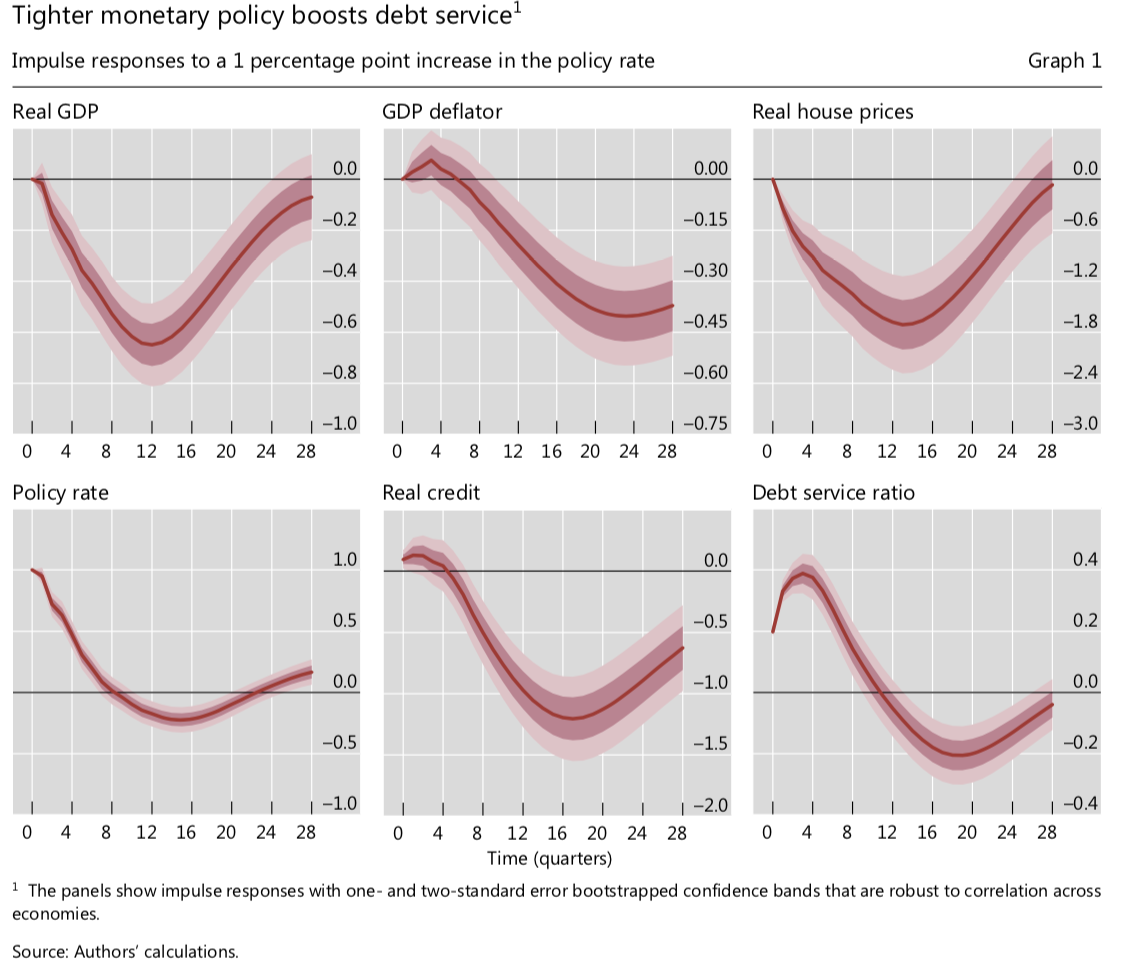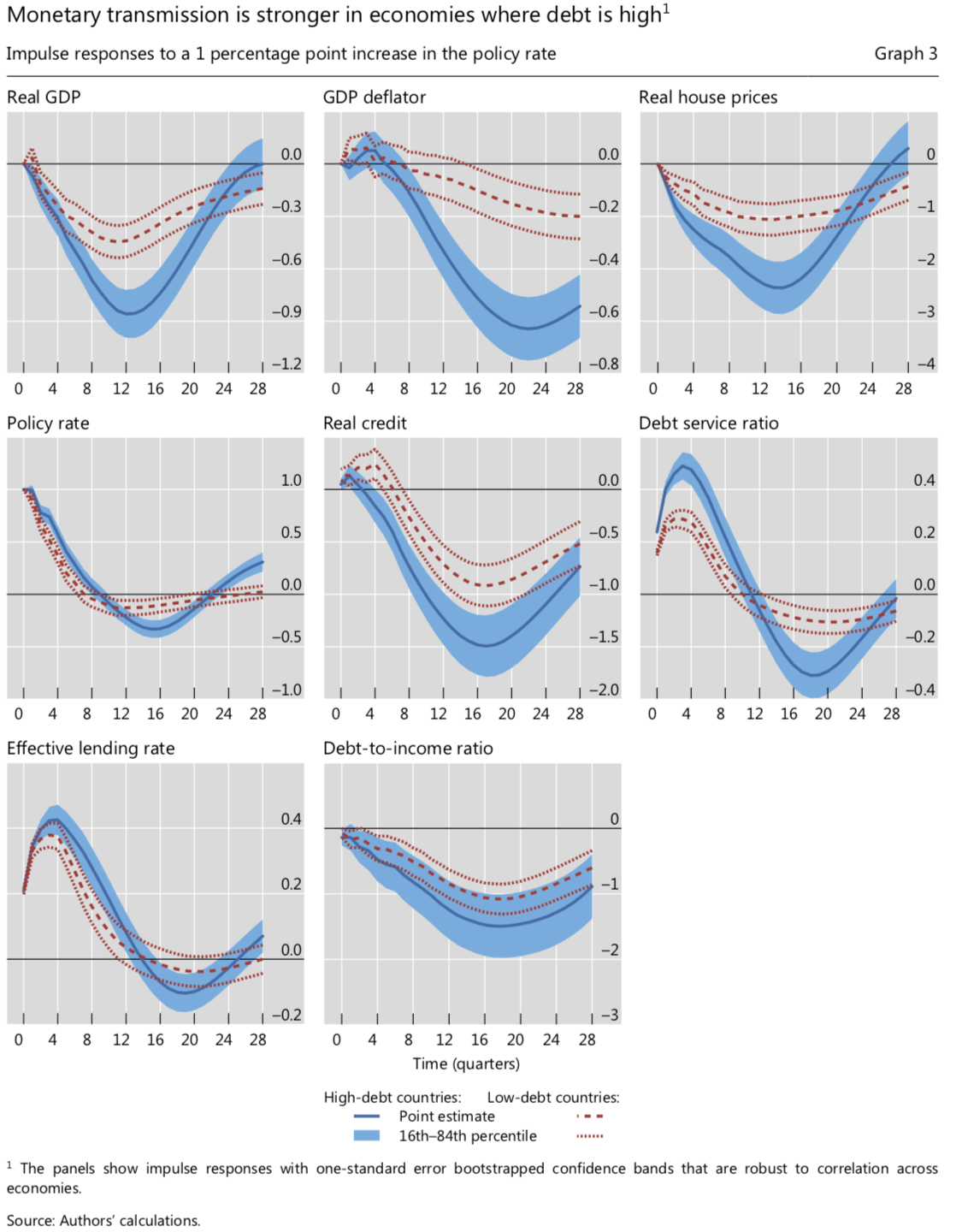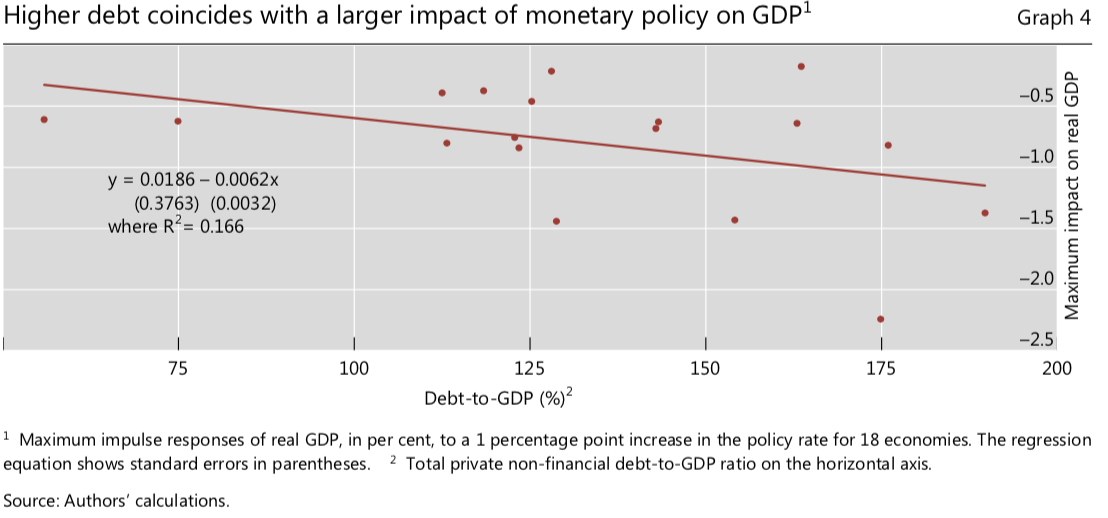BIZ-Studie: Höhere Zinsen wirken fatal
Gestern ging es darum, dass es zu einem “Zinsschock” kommen könnte. Es gibt viele Studien, die zeigen, dass eine hohe Verschuldung nicht nur die Krisenanfälligkeit erhöht, sondern auch die Überwindung einer Krise erschwert. Die verschuldeten Wirtschaftssubjekte müssen erst einmal ihre Bilanz sanieren und können schlichtweg bei höheren Zinsen weniger für andere Dinge ausgeben. Deshalb sind wir ja auch in den tiefen Zinsen gefangen. Die BIZ hat schon 2017 dazu publiziert:
- “There is growing evidence that high and rising debt is associated with sub-par medium-term growth (…) this effect is mainly attributable to changes in the debt service ratio (DSR) (…).” – bto: was als solches nicht überraschen kann.
- “Since debtors are typically credit- or liquidity- constrained, they are likely to have greater propensities to consume or invest out of changes in disposable income than creditors. Accordingly, an increase in the aggregate DSR, by transferring income from debtors to creditors, could reduce aggregate output because the decline in spending by debtors is only partially compensated by a rise in spending by creditors.” – bto: weshalb ja auch Leute wie Martin Wolf von der FINANCIAL TIMES immer wieder fordern, zu den Schuldnern umzuverteilen, was die Notenbanken auch versuchen.
- “Conversely, a lower DSR could boost economic activity because of the income transfer from creditors to debtors.” – bto: Heute geht es meines Erachtens noch viel weiter. Es genügt nicht, Einkommen umzuverteilen. Es wird zu einer Umverteilung von Vermögen kommen (müssen) durch Forderungs- = Schuldenvernichtung. Blöd, aber leider unumgänglich.
- “(…) the extraordinary monetary accommodation provided by the leading central banks in the wake of the Great Financial Crisis (GFC) was in part motivated by a desire to reduce the debt service burdens of households and firms through lower interest rates. And an oft-heard argument in the current debate about the appropriate pace of monetary policy normalisation is that high debt makes the economy more interest rate-sensitive, so that normalisation in highly indebted countries should proceed very cautiously.” – bto: Haha, das ist unmöglich!
- Damit kommen wir zu den Ergebnissen der empirischen Analyse: “(…) a monetary policy tightening triggers a significant and persistent increase in the DSR. (…) and this effect dominates a fall in debt-to-income ratios (…).” – bto: O. k., das dürfte nun niemanden überraschen. Die Party wird teurer und kommt deshalb zu einem Ende.
- “(…) monetary policy has a stronger impact on DSRs, as well as on economic activity, the price level, house prices and credit, in economies where private sector debt is higher.” – bto: Bedenken wir mal, was es für unsere heutige Lage bedeutet. Die Weltwirtschaft war noch nie so hoch geleveraged wie heute. Wir können also keinen Zinsanstieg = Margin Call gebrauchen. Gefangen in tiefen Zinsen können wir sie nur noch tiefer setzen. Deshalb glauben die Märkte auch nicht an die Zinswende. Andererseits haben wir gesehen, dass es schon acht Mal Phasen ständig fallender Zinsen gegeben hat, die alle zu einem Ende kamen. So dürfte es auch diesmal sein, dann aber mit deflationären Folgen der brutalsten Art.
- “A 1 percentage point shock to the policy rate causes real GDP and the GDP deflator to fall by a maximum of 0.6 % and 0.4 % after 12 and 22 quarters, respectively. House prices and credit respond more strongly, dropping by up to 1.7 % and 1.2 % after 13 and 17 quarters.” – bto: Das ist dann die Krise, siehe Spanien, Irland etc. nach dem Platzen der Immobilienblase.
- “The policy rate gradually returns to baseline and turns significantly negative eight quarters after the shock, reflecting the monetary policy response to the negative macro- financial effects triggered by the initial shock.” – bto: noch Fragen zur Geldpolitik heute? Wir haben nur das Problem, dass wir immer mehr Schulden machen.
Quelle: BIZ
- Wenig verwunderlich ist dann auch, dass “the stronger response of the DSR to monetary policy in the high-debt economies is driven by the higher initial debt level, rather than by the changes in the DSR components following the monetary policy shock”. – bto: einfach, weil es dann nötiger ist!
Quelle: BIZ
- “We also observe much stronger effects on economic activity and the price level in economies where private non-financial sector debt levels are higher. The peak responses of both real GDP and the GDP deflator are more than 0.4 percentage points larger in high-debt economies. (..) In the high-debt economies, the drop in house prices is 1.3 percentage points larger (…).” – bto: Auch das ist klar, aber schön, es nochmals bestätigt zu sehen.
- “(…) monetary policy has a stronger impact in economies where private debt is high. (…) The correlation is negative and significant: GDP decreases more after a contractionary monetary policy shock in economies with high debt.” – bto: weshalb es so spannend ist, was im nächsten Jahr passiert.
Quelle: BIZ
Dann kommen die Autoren zu ihrem – nicht überraschenden – Fazit, das wir im Hinterkopf haben müssen, wenn wir uns überlegen, wie es wirtschaftlich und an den Finanzmärkten weitergeht.
- “Our results confirm that a (…) change in the monetary policy stance, (…), triggers a significant and persistent change in the DSR in the same direction.” – bto: nicht verwunderlich.
- “the effects of monetary policy on DSRs, as well as on economic activity, the price level, credit and housing markets, are significantly larger in countries with high private non-financial sector debt. The level of debt and the corresponding response of the DSR might therefore be important for the transmission of monetary policy”. – bto: Die Notenbanken sind dazu verdammt, die Schuldner immer wieder rauszuhauen. Wenn das kein Moral-Hasard ist?
- “These findings suggest that the extraordinary monetary accommodation engineered by leading central banks in the wake of the Great Financial Crisis may have alleviated debt service burdens in highly indebted countries. This might have played an important role in dampening the after-effects of the crisis and in supporting the recovery.” – bto: Bestimmt, aber sie legen die Basis für eine noch größere Rettungsaktion!
- “At the same time, our results also suggest that persistent high debt levels may represent a complicating factor in the ongoing or prospective normalisation of monetary policy in many economies. We find that economies with high debt are more interest rate-sensitive, so that a policy tightening could have stronger adverse macroeconomic effects than otherwise.” – bto: billiges Geld for ever! Das wird es aber nicht geben können. Denn: “(…) high debt makes it harder to raise rates, but keeping rates low induces further debt accumulation”. – bto: So ist es!
Hier auch nochmals der Link zur ganzen Studie: BIS Quarterly Review










